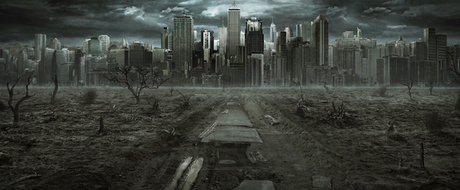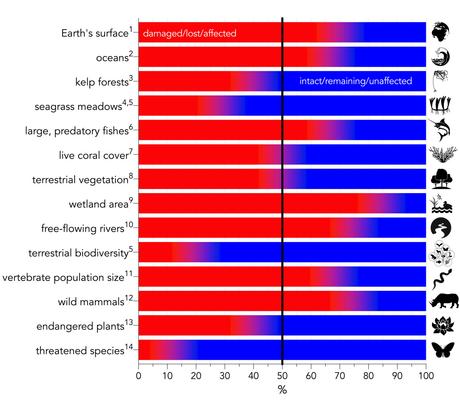“I wish it need not have happened in my time,” said Frodo. “So do I,’ said Gandalf, “and so do all who live to see such times. But that is not for them to decide. All we have to decide is what to do with the time that is given us.”
Frodo Baggins and Gandalf, The Fellowship of the Ring
Today, 16 high-profile scientists and I published what I describe as a ‘cold shower’ about society’s capacity to avoid a ghastly future of warfare, disease, inequality, persecution, extinction, and suffering.
And it goes way beyond just the plight of biodiversity.

No one who knows me well would mistake me for an optimist, try as I might to use my colleagues’ and my research for good. Instead, I like to describe myself as a ‘realist’. However, this latest paper has made even my gloomier past outputs look downright hopeful.
And before being accused of sensationalism, let me make one thing abundantly clear — I sincerely hope that what we describe in this paper does not come to pass. Not even I am that masochistic.
I am also supportive of every attempt to make the world a better place, to sing about our successes, regroup effectively from our failures, and maintain hope in spite of evidence to the contrary.
But failing to acknowledge the magnitude and the gravity of the problems facing us is not just naïve, it is positively dangerous and potentially fatal.
It is this reason alone that prompted us to write our new paper “Underestimating the challenges of
avoiding a ghastly future” just published in the new journal, Frontiers in Conservation Science.
While the paper is a pull-no-punches assessment of the state of global biodiversity, its main purpose is in fact to demonstrate how little capacity we seem to have regarding any real chance to change the course of things. Everything from biodiversity death spiral, to runaway climate change, to overconsumption and overpopulation, to acute political impotence to do anything meaningful and at the necessary scale — we provide an admittedly brief, yet stark appraisal that things are heading in the worst possible of directions.

Figure 1 from the paper: Summary of major environmental-change categories expressed as percentage relative to the baseline given in the text. Red indicates the percentage of the category that is damaged, lost, or otherwise affected, whereas blue indicates the percentage that is intact, remaining, or otherwise unaffected. Superscript numbers indicate the following references: 1IPBES, 2019; 2Halpern et al., 2015; 3Krumhansl et al., 2016; 4Waycott et al., 2009; 5Díaz et al., 2019; 6Christensen et al., 2014; 7Frieler et al., 2013; 8Erb et al., 2018; 9Davidson, 2014; 10Grill et al., 2019; 11WWF, 2020; 12Bar-On et al., 2018; 13Antonelli et al., 2020; 14Mora et al., 2011.
The paper is a fairly non-technical description of the state of the world, so I won’t bother repeating our main points here. Neither is the paper too long.
However, I think it’s important to state that while we had neither the space nor the time to get into the details of what’s actually required to avoid the worst-case scenario, there are plenty of organisations (and academics) around the world devoted to real-world, at-scale solutions (e.g., ipbes.org, goodanthropocenes.net, overshootday.org, mahb.stanford.edu, populationmatters.org, clubofrome.org, steadystate.org, to name a few). But as we state in the paper, “The remaining questions are less about what to do, and more about how …”.
In reality, we know what we need to do, like fundamentally changing our economic and political systems, including the abolition of perpetual economic growth, properly pricing externalities, rapid exit from the use of fossil fuels, strict market regulation and limits on property acquisition, reigning in corporate lobbying, and the empowerment of women across the globe.
Given the existence of the human ‘optimism bias’ that triggers many to underestimate the severity of the crisis and ignore expert warnings, it is essential that we “… eschew reticence, avoid sugar-coating the overwhelming challenges ahead and tell it like it is. Anything else is misleading at best, or negligent and potentially lethal for the human enterprise at worst.”
CJA Bradshaw, in conjunction with PR Ehrlich, A Beattie, G Ceballos, E Crist, J Diamond, R Dirzo, AH Ehrlich, J Harte, ME Harte, G Pyke, PH Raven, WJ Ripple, F Saltré, C Turnbull, M Wackernagel & DT Blumstein

